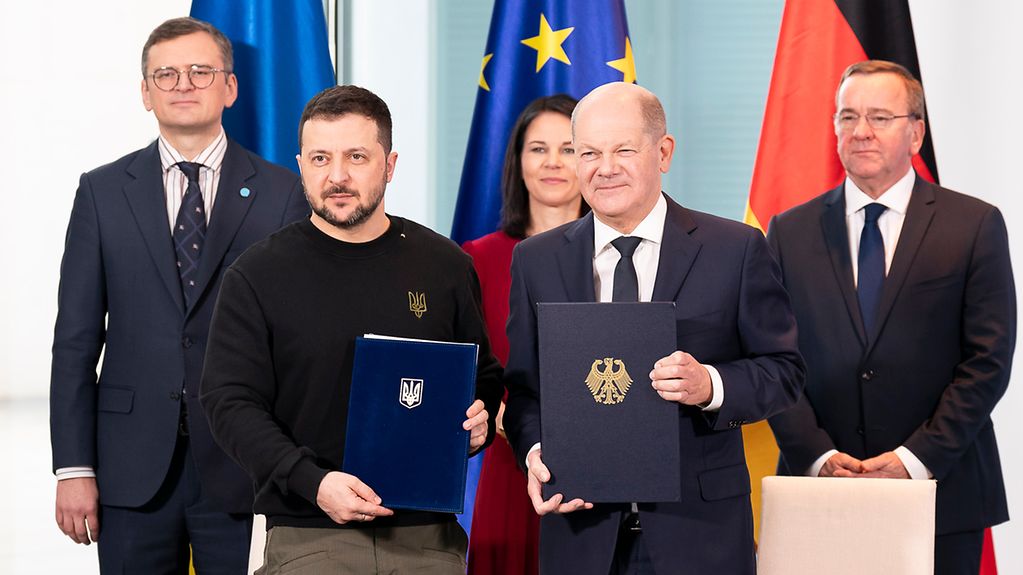Visit by Ukrainian President Zelensky
Federal Chancellor Scholz and Ukrainian President Zelensky have signed an agreement on long-term security commitments. The Federal Chancellor said he was shocked to hear of Alexei Navalny’s death.
4 min reading time

Federal Chancellor Scholz with President Zelensky: the security agreement is a historic step in German-Ukrainian relations.
Photo: Federal Government/Kugler
Following his conversation with Ukrainian President Volodymyr Zelensky, Federal Chancellor Olaf Scholz highlighted the special quality of relations between Germany and Ukraine, while also paying tribute to the resilience of all the brave Ukrainian women and men. Shortly before the second anniversary of Russia’s attack on Ukraine, the Federal Chancellor commemorated all those who lost their lives in this cruel and murderous war.
The two heads of state and government signed a bilateral security agreement in Berlin. The importance of the document could hardly be overstated, said the Federal Chancellor, adding that it was a “historic step forward” in German-Ukrainian relations.
Death of Russian opposition politician Alexei Navalny
The Federal Chancellor said he had been deeply shocked to hear of the death of Alexei Navalny a short time previously. The Russian opposition politician had been imprisoned in Russia since January 2021. “We must assume that Navalny died in a Russian prison. This is most disturbing,” said the Federal Chancellor, adding that
Navalny had been brave to return to Russia in 2021 after his recovery in Berlin. He had now paid for his courage with his life, Scholz said. “This shows perhaps more starkly than ever the kind of regime we are dealing with. Anyone expressing criticism or standing up for democratic values must fear for their safety and their life.” Russia had long ceased to be a democracy, said the Federal Chancellor. Navalny’s years of inhumane imprisonment were the result of hypocritical, politically motivated sentences. He campaigned for democracy, freedom, and the rule of law in Russia.
German-Ukrainian security agreement
The bilateral agreement that has now been signed stipulates that Germany will continue to support independent Ukraine in its defence against the Russian offensive for as long as is necessary, as Federal Chancellor Scholz emphasised. In concrete terms this involves such aspects as the following:
- Support in building modern defence forces that will enable the country to deter any future attack. If there is renewed Russian aggression in the future, the agreement provides for detailed support agreements: not just of a diplomatic and economic nature but also – as is currently the case – involving military equipment.
- Support services in the civilian sector, such as mine clearance, securing the energy infrastructure, and rebuilding the country in the wake of destruction.
- In return, Ukraine is committed to continuing its reform brief, which is also crucial to the country’s future EU membership.
See here for the agreement on security cooperation and long-term support between the Federal Republic of Germany and Ukraine in German and in English. It seeks to implement the G7 Joint Declaration issued in Vilnius on 12 July 2023. The first subsequent bilateral security agreement between Ukraine and the UK was concluded on 12 January 2024; other partners are planning to follow suit.
Additional military aid package worth 1.1 billion euros
In Berlin on Friday, the Federal Chancellor also promised the Ukrainian President another military aid package worth some 1.1 billion euros. This includes the delivery of 36 tank and wheeled howitzers from industrial stocks, 120,000 rounds of artillery ammunition, two further Skynex air defence systems, and a number of urgently needed IRIS-T missiles
Support in defending against the Russian aggressor
Since the start of the Russian attack almost two years ago, Germany has done its utmost to support Ukraine in defending itself – financially, politically and also by supplying weapons. In 2024, the Federal Government provided some 7.1 billion euros worth of military support for Ukraine, as well as earmarking 6 billion euros for subsequent years.
All in all, Germany had provided or pledged resources worth some 28 billion euros in purely military aid to Ukraine, said the Federal Chancellor. The Federal Government also provides substantial civilian support, both bilaterally and as part of the EU; in addition it has borne the additional domestic costs incurred, such as supporting Ukrainian refugees in Germany.
Appeal to the US Congress
The Federal Chancellor also took the opportunity to appeal once again to the United States Congress to take the necessary decisions now that would ensure financial and military support could continue to be provided for Ukraine. Support from the USA was vital to Ukraine’s security and self-defence capabilities, said the Federal Chancellor.
Crystal clear message to the Russian President
“There is no question that we all want this brutal war to end as soon as possible,” stressed the Federal Chancellor. But in response to those calling for a rapid ceasefire and negotiations with Russia, the Federal Chancellor said that Russia should not get to dictate the terms of any peace. Unfortunately, he said, Russia was not prepared to agree to a lasting and just peace: “On the contrary: it is sticking relentlessly to its war objectives – as Putin stated quite clearly again only recently.”
As such, the bilateral signing between Germany and Ukraine and the pledge of further military support would also send a crystal clear message to the Russian President, said Scholz. “We will not let up in our support for Ukraine! We stand firmly shoulder-to-shoulder with the Ukrainians.”
2024 Reconstruction Conference
Together with Ukraine itself, Germany will be jointly hosting this year’s Ukraine Recovery Conference on 11 and 12 June 2024. This event has been held every year since 2017 in various European countries and also in Canada. The aim is to support Ukraine on its path of democratic reform and European integration.